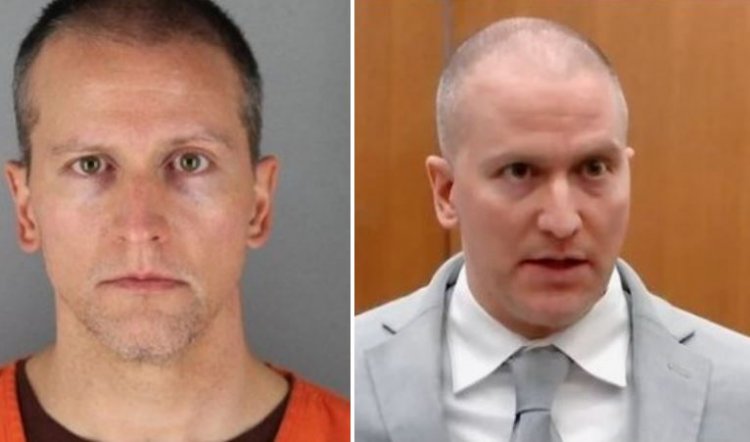Chauvin, expected to plead guilty in Floyd civil rights case
Former Minneapolis police officer Derek Chauvin appears to be on the verge of pleading guilty to violating the civil rights of George Floyd to spend time behind bars.

A notice sent Monday by the court's electronic filing system shows a hearing is scheduled for Wednesday for Chauvin to change his plea to not guilty. Those types of notices usually indicate a defendant plans to plead guilty, though nothing is official until it happens in court.
Chauvin has already been convicted of state murder and manslaughter for pressing his knee to Floyd's neck when the black man said he could during an arrest on the 25th. He was sentenced to 22 1/2 years in that case.
A message left by Chauvin's attorney, Eric Nelson, was not immediately returned. The U.S. Attorney's Office did not comment.
Chauvin and three other former officers—Thomas Lane, J. Kueng and Tou Thao - were indicted earlier this year on federal charges of willfully violating Floyd's rights. They were scheduled to go on trial in late January.
Chauvin's plea could be positive for the other three. They had asked the court to separate their trials from Chauvin's, arguing that his presence would hurt them before a jury, but that request was denied. Mike Brandt, a local defense attorney not associated with the case, said a trial without Chauvin could reduce some of the inflammatory evidence jurors would see.
Brandt also has said Chauvin could be forced to testify if he pleads guilty—which could benefit the others, saying he was the experienced officer who made the decision to do what he did.
The information sent Monday gives no indication that the other officers intend to plead guilty. Messages for their attorneys were not immediately returned.
Mark Osler, a professor at the University of St. Thomas School of Law, said any potential prison sentence Chauvin would face in the federal case would likely be served concurrently with his state sentence—but the federal sentence has the potential to be much longer, up to life in prison.
Chauvin can shorten his federal sentence by pleading guilty. Although rare, Osler said he also can arrange to serve his sentence in the federal system, which could benefit him since he is in solitary confinement in Minnesota. Brandt added that Chauvin is still known in the federal system and may still need to be separated.
"I suspect he actually negotiated something that would allow him to see the light of day before he left Earth," Brandt said.
But the federal system has no parole, so even with a reduced federal sentence, Chauvin could spend more time behind bars.
In Minnesota, defendants in good behavior serve two-thirds of their sentence in prison and the remaining third under supervised release, also known as parole. Under that formula, he is expected to serve 15 years in prison and 7 1/2 years on probation for state charges.
Under sentencing guidelines, Chauvin could get a federal sentence of 27 years to more than 33 years in prison, with credit for responsibility, Osler said. But the guidelines are not mandatory, and Osler estimated Chauvin would be sentenced at the low end of the range.
According to evidence in the state case against Chauvin, Kueng and Lane helped restrain the 46-year-old Floyd when he was on the ground - Kueng knelt on Floyd's back and Lane held Floyd's legs. Thao held spectators back and kept them from intervening during the 9 1/2 minutes of restraint.
Floyd's arrest and death, which a bystander captured on cell phone video, sparked mass protests nationwide that called for an end to racial inequality and police mistreatment of blacks.
All four former officers were charged in federal court broadly with depriving Floyd of his rights while acting under government authority, but the federal indictment broke the counts even further. An indictment against Chauvin alleged he violated Floyd's right to be free from unreasonable seizure and unreasonable force by a police officer.
Thao and Kueng are charged with violating Floyd's right to be free from unreasonable seizures by failing to stop Chauvin while he was kneeling on Floyd's neck. All four officers are charged with failing to provide Floyd with medical care.
It was not immediately clear whether Chauvin plans to plead guilty to all or some of the federal charges against him in Floyd's death.
Osler said he was not surprised that the other three former officers do not appear to be involved in that plea deal because they would likely face much lighter sentences than Chauvin if convicted.
If they pleaded guilty, Osler said, the other three would likely want "a plea deal that includes both the state and federal charges."
The other three men also were charged in state court with accessory to murder and manslaughter. They are scheduled to go on trial in that case in March.
Chauvin is also charged in a second indictment with forcible confinement and neck restraint of a 14-year-old boy in 2017.
That indictment alleges Chauvin deprived the boy, who is black, of the right to free himself from unreasonable force when he held him by the throat, struck him on the head with a flashlight and held his knee to the boy's neck and upper back while he was prone, handcuffed and did not resist. Information from the court gave no indication that Chauvin would change his plea in this case.
"Former Minneapolis police officer"......not murderer, because that would seem to harsh.






